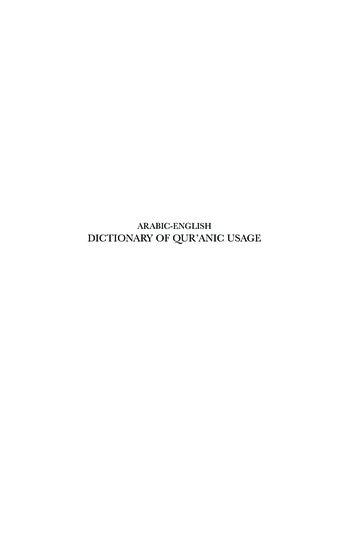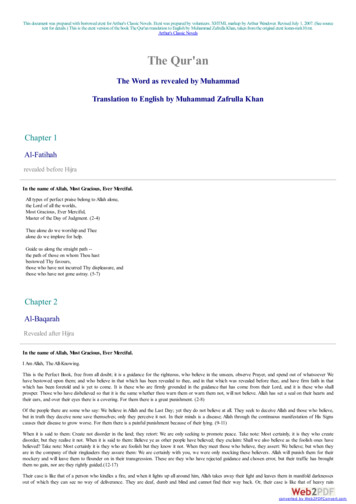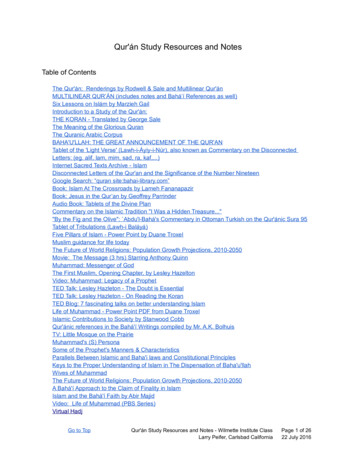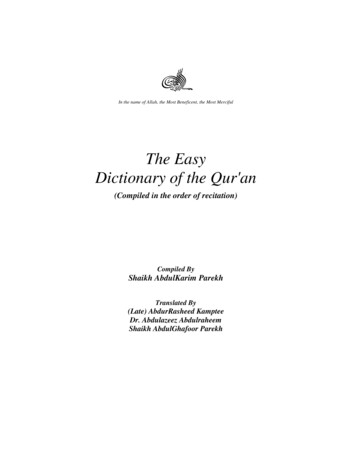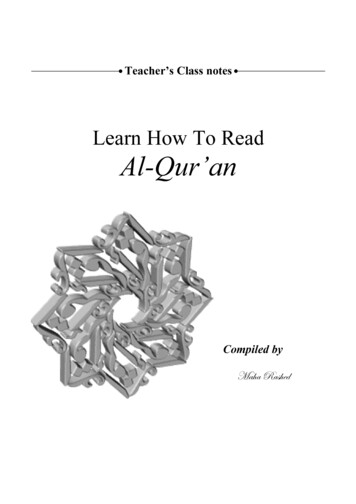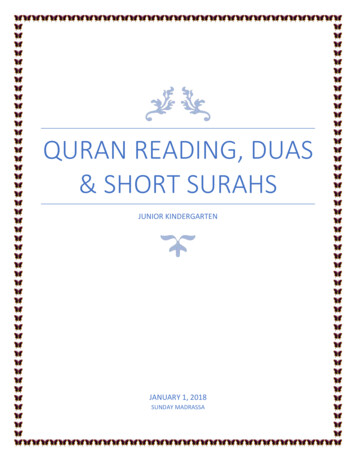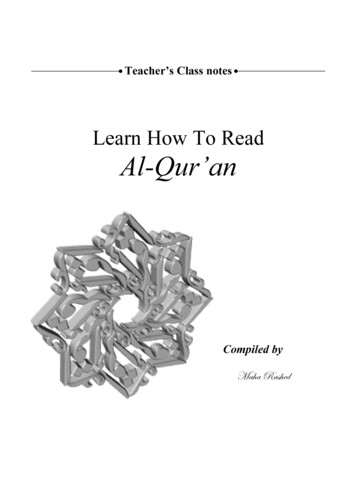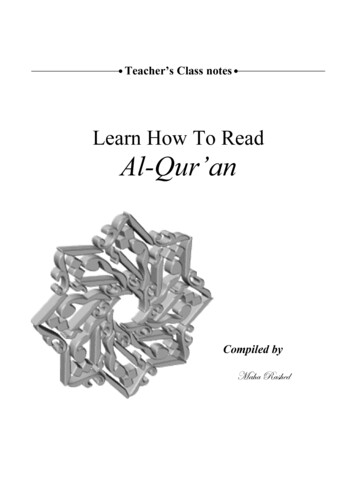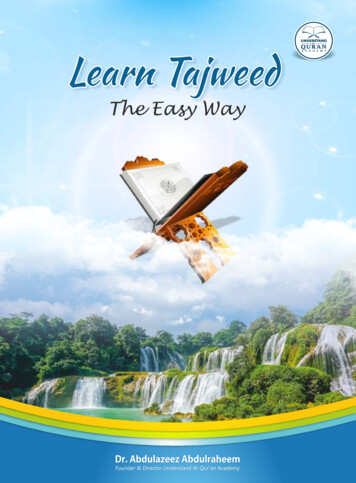
Transcription
The GreatQur’anAn EnglishTranslation
The GreatQur’anAn EnglishTranslation“. a Book which We have sent down to you sothat you may bring the people out of the darknessand into the light.” (Qur’an 14:1)FIFTH REVISIONThe Monotheist GroupBrainbow PressUnited States of America
The Great Qur’an: An English TranslationCopyright 2022 by The Monotheist GroupAll rights reserved. No part of this book may be used or reproduced byany means, graphic, electronic, or mechanical, including photocopying,recording, taping or by any information storage retrieval system withoutthe written permission of the publisher except in the case of briefquotations embodied in critical articles and reviews.For mwww.ProgressiveMuslims.OrgISBN-13: 978-0-9825867-7-8 (pbk)ISBN-13: 978-0-9825867-8-5 (cloth)ISBN-10: 0-9825867-7-9 (pbk)ISBN-10: 0-9825867-8-7 (cloth)Printed in the United States of America
This work represents a translation of the divine words as revealed bythe Almighty over 1,400 years ago and in no way is the translation itselfdivine or perfect. Any shortcomings are purely due to human error andthe reader is always advised to independently verify what he/she reads.“And do not uphold what you have no knowledge of; for the hearing,and eyesight, and mind—all these you are responsible for.”(Qur’an 17:36)Errata Notice:As the Qur’an translation is a human effort, you may occasionallynote a discrepancy in our interpretation or an error in translation.We are working hard to have the most accurate translation available,and thus will be regularly updating the work. The print version maybe slightly behind in updates compared to the online version. Theonline version may be found at (www.free-minds.org/quran). Shouldyou find an error, please notify us at (free@free-minds.org).
‘Our Lord, forgive us our sins and our shortcomings in our responsibility, and make firm our foothold, and grant us victory over therejecting people.’(Qur’an 3:147)
ContentsPreface.iA. Methodology for this Translation. iiiB. The Qur’an Initials. viC. How to Study the Qur’an. viiChapter 1. 1Chapter 2. 1Chapter 3. 30Chapter 4. 47Chapter 5. 64Chapter 6. 77Chapter 7. 92Chapter 8. 109Chapter 9. 115Chapter 10. 127Chapter 11. 136Chapter 12. 146Chapter 13. 155Chapter 14. 160Chapter 15. 164Chapter 16. 169Chapter 17. 179Chapter 18. 187Chapter 19. 196Chapter 20. 202Chapter 21. 210Chapter 22. 217Chapter 23. 224Chapter 24. 231Chapter 25. 237Chapter 26. 242Chapter 27. 252Chapter 28. 259Chapter 29. 266Chapter 30. 272Chapter 31. 276Chapter 32. 279Chapter 33. 281Chapter 34. 288
Chapter 35. 292Chapter 36. 296Chapter 37. 301Chapter 38. 309Chapter 39. 314Chapter 40. 320Chapter 41. 326Chapter 42. 331Chapter 43. 335Chapter 44. 341Chapter 45. 343Chapter 46. 346Chapter 47. 350Chapter 48. 353Chapter 49. 356Chapter 50. 358Chapter 51. 360Chapter 52. 363Chapter 53. 365Chapter 54. 368Chapter 55. 371Chapter 56. 374Chapter 57. 378Chapter 58. 381Chapter 59. 383Chapter 60. 386Chapter 61. 387Chapter 62. 389Chapter 63. 390Chapter 64. 391Chapter 65. 392Chapter 66. 394Chapter 67. 395Chapter 68. 397Chapter 69. 399Chapter 70. 402Chapter 71. 404Chapter 72. 405Chapter 73. 407Chapter 74. 408Chapter 75. 411
Chapter 76. 412Chapter 77. 414Chapter 78. 416Chapter 79. 418Chapter 80. 420Chapter 81. 422Chapter 82. 423Chapter 83. 424Chapter 84. 425Chapter 85. 426Chapter 86. 427Chapter 87. 428Chapter 88. 429Chapter 89. 430Chapter 90. 432Chapter 91. 433Chapter 92. 433Chapter 93. 434Chapter 94. 435Chapter 95. 435Chapter 96. 436Chapter 97. 437Chapter 98. 437Chapter 99. 438Chapter 100. 438Chapter 101. 439Chapter 102. 439Chapter 103. 440Chapter 104. 440Chapter 105. 440Chapter 106. 441Chapter 107. 441Chapter 108. 441Chapter 109. 442Chapter 110. 442Chapter 111. 442Chapter 112. 443Chapter 113. 443Chapter 114. 443Qur’an Index by Topic. 445
PrefaceWith so many English translations of the Qur’an available, it isinevitable that the reader would ask “why make another one?” Theanswer to that question lays in the current structure of the Islamic faithitself, and the fact that, for many centuries, Islam has been primarilysubcategorized as either “Sunni” or “Shia” or one of the many otherdenominations that have emerged over the years.As such, all translators have belonged to one school of thought oranother which clearly comes across in the interpretation of and choiceof translation for specific words or verses.The Great Qur’an: An English Translation is an attempt to be free fromthe influences of sectarianism, delivering to the reader a rendition asclose to the pure message of the Qur’an as possible.“Those who have divided their system and become sects, you arenot with them in anything. Their matter will be with God, then Hewill inform them of what they had done.” (Qur’an 6:159)The Great Qur’an: An English Translation is the result of a group effort bypeople who do not belong to any denomination, and, for the first timein many centuries, are simply proud to call themselves “Muslims,”submitting to God alone.“And strive for God a genuine striving. He is the One who haschosen you, and He has made no hardship for you in the system,the creed of your father Abraham; He is the One who named you‘those who have submitted’ (Muslimeen) from before and in this. Solet the messenger be witness over you and you be witness over thepeople. So hold the Connection and contribute towards purificationand hold tight to God, He is your patron. What an excellent Patron,and what an excellent Supporter.” (Qur’an 22:78)The Great Qur’an: An English Translation is unique in the fact that ituses neither footnotes nor comments letting the text speak for itselfand delivering to the reader a rendition of the pure message of theQur’an which is in itself a ‘fully detailed’ Book.“‘Shall I seek other than God as a judge when He has sent downi
to you the Book fully detailed?’ Those to whom We have given theBook know it is sent down from your Lord with the truth; so do not beof those who have doubt. And the word of your Lord is completed withtruth and justice; there is no changing His words. He is the Hearer, theKnower.” (Qur’an 6:114-115)Finally, no matter how much can be said about this translation or anyother, it is imperative to point out that guidance cannot come from anytext or human being, rather, true knowledge and guidance can only comefrom the One who initiated the heavens and the earth. It is God alonethat we seek for help.“You alone we serve, and You alone we seek for help.” (Qur’an 1:5)Welcome to the path of God Alone.Welcome to The Great Qur’an.ii
A. Methodology for this TranslationThis work is the culmination of years of group research and study intothe Qur’an and its nature, and is an attempt to reintroduce people to thewords of God with authenticity and objectivity.The most significant points that the reader needs to be aware of withregards to this translation are as follows:1. Chapter HeadingsIn reviewing the oldest written records of the Qur’an, it was found thatno actual chapter names as used in current printed editions ever existed(e.g. ‘the cow, the family of Imran, the women, etc.’) and that they werelater insertions to ease reference.Image from chapter 10 of the SanaaQur’an dated around 800 AD.1 which showsno chapter name/headingWhile this translation does use numeric chapter headings to easereader reference, the removal of the ‘names’ has been done to maintainauthenticity of the revealed text.1. UNESCO hoto/3355iii
2. The ‘Basmallah’Current printed editions of the Qur’an record the ‘Basmallah’ (the titlewhich reads: ‘In the name of God, the Almighty, the Merciful’) at thestart of each chapter/sura (with the exception of chapter/sura 9). However,what is peculiar is that the Basmallah is only counted as a verse at thebeginning of the Qur’an in 1:1, while all the remaining Basmallah’s thatprefix other chapters/suras are unnumbered.Research into this matter by looking at the older texts has been unableto yield the background or rationale into this different treatment forthe Basmallah, however, what is apparent is that even with the oldestsurviving copies, the Basmallah prefixes nearly all chapters/suras.Image from chapter 3 of the Gold Qur’andated around 800 AD.2 which shows the‘Basmallah’ followed by a verse stopThis translation has included the Basmallah’s in nearly all chapterswhile following the common convention of not numbering them withthe exception of 1:1.3. Hafs Vs. WarshOne of the least known facts regarding the Qur’an is the existence ofslight variations between existing printed versions (up to ten copies existwith minor variations, with the two most prominent being known underthe names of ‘Hafs’ and ‘Warsh’)3.While there is no variation with regards to the bulk text of theQur’an (i.e. nearly the same number of words, and sequence of words,2. All scans of Gold Qur’an are made available by John Hopkins University(http://goldkoran.mse.jhu.edu/).3. Al-Qiraat Al-Ashr Al-Mutawatira, by Allawi Mohammed Balfaqeeh (Published byDar Al-Mahajir)iv
in all versions), there is a slight difference in some of the spelling ofcertain words as well as the issue of the location of verse ‘stops’ whichsignificantly differ from one version to the other.Although the ‘Warsh’ style of separating the verses is found to be morein-line with the older surviving texts, the approach of this translationhas been to remain with the common ‘Hafs’ numbering of verses asbeing the most prevalent among Muslims (Warsh being limited mainlyto parts of North Africa).4. The Missing ‘Basmallah’Another noticeable aspect of the printed Qur’an is the lack of a ‘Basmallah’at the beginning of chapter/sura 9. Information written regarding thissubject does not provide the rationale behind such treatment, whilesome of the discussion revolve around the structure of the Qur’anperhaps being 113 chapters rather than 114 (this is argued on the basisof combining chapters 8 and 9 due to the lack of the Basmallah).In reviewing the older written texts, it was found that the older textsindeed do not carry a Basmallah for chapter 9, and that the ability torealize the separation between chapters 8 and 9 is achieved through aman-made injection of the chapter detail to highlight the beginning ofa new chapter.Image from chapter 9 of the Gold Qur’an showing inserted chapterdetail to mark separationAlthough no definitive answer to this issue has been found, it is beingpointed out for the sake of transparency that this translation is followingthe common convention of having 114 chapters, without a Basmallahfor chapter 9.v
B. The Qur’an InitialsA unique feature of the Qur’an is the presence of 14 initials at the outsetof 29 out of the total 114 chapters:No.Chapter No.Quaranic .vi
The meaning ascribed to these initials has been speculated over thecenturies, with the most contemporary being that they are mathematicalkeys designed to preserve the authenticity of the Qur’an, or that the14 letters represent the differentiation between the “Muhkam” and“Mutashabih” verses outlined in 3:7.We leave it to the reader to examine this phenomenon and come tohis/her own conclusions.C. How to Study the Qur’anIf you are one of those who wish to seek knowledge and improve onyour understanding of the Qur’an, then we have identified seven keystudy points which may be put to use by both novices and experts.These points will appear to be quite obvious once you read them, butsometimes, being reminded, benefits us all.1. LanguageisNotaBarrierThe first point of contention in the study of the Qur’an typically islanguage. Many of the people who want to uphold the Qur’an havebeen informed that the Book of God can only be recited or studied inthe original Arabic language, and that any translation will not give theproper meaning. The flip-side is that these same “experts” will thentell the Arabic speakers that the Qur’an is “too difficult” for them tounderstand and that they should leave its understanding to the scholars!Of course, the Qur’an itself says that language is not a barrier to itsunderstanding as God is the One who is making it understood to peoplewho open their hearts to Him and become purified.“And had We made it a Qur’an that was non-Arabic, they would havesaid: ‘If only its verses were made clear!’ Non-Arabic or Arabic, say:‘For those who believe, it is a guide and healing. As for those whodisbelieve, there is deafness in their ears, and they are blind to it.These will be called from a place far away.’” (Qur’an 41:44)“It is an honorable Qur’an. In a protected Book. None can graspit except those purified. A revelation from the Lord of the worlds.”(Qur’an 56:77-80)vii
2. Lookat theFull VerseQuoting the Qur’an out of context is by far the biggest error that evenseasoned students continue to fall into. Such method can be used tojustify any desire or any view no matter how ungodly it may appear.To take an example, a favorite quote which is repeated by manyunknowledgeable groups is that the Qur’an promotes killing andviolence as evidenced by the verse:“And you may kill them wherever you engage them ” (Qur’an 2:191).However, once we use the method of full context, then a totally differentpicture appears regarding the same issue:“And you may kill them wherever you engage them, and expel themfrom where they expelled you, and know that persecution is worse thanbeing killed. And do not fight them at the restricted Temple unless theyfight you in it; if they fight you then kill them, thus is the recompense ofthe rejecters.“ (Qur’an 2:191)Here we have a case of warfare being engaged in, and the people who weredriven out being allowed to fight and reclaim their land/territory A far cryfrom the sporadic killing that is implied when quoting out of context.3. The Qur’an Explains ItselfThe Arabic language, as with any other language, has undergone somesubtle changes over the centuries where words may not still retain theiroriginal meanings, and where the common spoken and written formhave diverted to become the standard. When faced with a choice wherethere appears to be a discrepancy in a given meaning, let the other versesof the Qur’an, where such word is used, be your guide:[Yusuf Ali Translation]: “Those who follow the messenger, the unlettered(Ummy) Prophet, whom they find mentioned in their own (scriptures),in the law and the Gospel;- for he commands them what is just andforbids them what is evil; he allows them as lawful what is good (andpure) and prohibits them from what is bad (and impure); He releasesthem from their heavy burdens and from the yokes that are upon them.”(Qur’an 7:157)viii
The word ‘Ummy’ in today’s Arabic dictionaries and common userefers to a person who: ‘cannot read or write.’ Therefore, when reading theQur’an, the understanding given is that the Prophet was an illiterate manwho delivered this magnificent text from inspiration, and had it recordedby scribes! However, when we look at the use of the word in other verses ofthe Qur’an, we find that its use gives the meaning of: ‘Gentiles,’ who hadno knowledge of any previous scriptures:“If they debate with you, then say: “I have submitted myself to God,as well as those who follow me.” And say to those who have receivedthe Book and the gentiles (Ummyeen): “Have you submitted?” If theyhave submitted then they are guided, and if they turn away, then youare only to deliver, and God is Seer over the servants. ” (Qur’an 3:20)Another word that has had its meaning diverted over time is the nameof God: ‘Al-Rahman,’ which has come to indicate ‘Most Gracious/AllMerciful/Beneficent.’ This name is thought to be a synonym of the othername widely used in the Qur’an ‘Al-Raheem’, however, we know from theQur’an that the Arab speakers of the time did not recognize this name, letalone its meaning:’“And if they are told: “Prostrate to (Al-Rahman).” They say: “Andwhat is (Al-Rahman)? Shall we prostrate to what you order us?” And itincreases their aversion. (Qur’an 25:60)The word use of the Qur’an gives us a completely different meaningfor this name, indicating that it is a name of power and might, used toinstil fear in God’s enemies—not mercy and compassion—best translatedas ‘The Almighty’:“So she took a veil to separate her from them, so We sent Our Spiritto her, and he took on the shape of a mortal in all similarity. She said:“I seek refuge with the Almighty (Al-Rahman) from you if you arerighteous.” (Qur’an 19:17-18)“My father, do not serve the devil. For the devil was everdisobedient to the Almighty (Al-Rahman). My father, I fear thata retribution will inflict you from the Almighty (Al-Rahman) andthat you will become an ally to the devil.” (Qur’an 19:44-45)ix
4. Be Awareof theContextSome Arabic words, like in English, can have slightly different meaningsdepending on the context they are placed in. One such example is theword ‘Daraba’ which has a natural meaning of putting forth or positioningas can be seen in the verses below:“Did you not note how God puts forth (Daraba) the example that agood word is like a good tree, whose root is firm and whose branchesare in the sky.” (Qur’an 14:24)“For the poor who face hardship in the cause of God, they cannot goforth (Darban) in the land; the ignorant ones think they are rich fromtheir modesty; you know them by their features, they do not ask thepeople repeatedly. And what you spend out of goodness, God is fullyaware of it.” (Qur’an 2:273)“Shall We withdraw (NaDrib) the reminder from you, because you area transgressing people?” (Qur’an 43:5)“O you who believe, if you go forth (Darabtum) in the cause of God,you shall investigate carefully. And do not say to those who greet youwith peace: “You are not a believer!” You are seeking the vanity of thisworld; but with God are many riches. That is how you were before, butGod favored you, so investigate carefully. God is expert over what youdo.” (Qur’an 4:94)However, there are certain cases where this word can give the meaningof ‘strike/beat’ as the act of striking involves the hand being put forth:“So how will it be when their lives are terminated by the angels, whilestriking (Yadriboona) their faces and their backs?” (Qur’an 47:27)While this may not appear as a big issue, not looking at the context canhave serious consequences as we can see in the meaning that has ascribedto the word ‘Daraba’ by the majority of translators for verse 4:34:[Yusuf Ali Translation]: Men are the protectors and maintainers ofwomen, because Allah has given the one more (strength) than theother, and because they support them from their means. Therefore therighteous women are devoutly obedient, and guard in (the husband’s)x
absence what Allah would have them guard. As to those women onwhose part ye fear
The Great Qur’an: An English Translation is an attempt to be free from the influences of sectarianism, delivering to the reader a rendition as close to the pure message of the Qur’an as possible. “Those who have divided their system and become sects, you are not with

